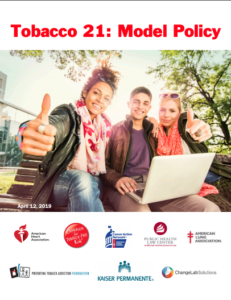As of May 24, 2019, 14 states across the U.S. have enacted legislation to raise the legal age for tobacco to 21, and 3 other states (New York, Maryland, and Vermont) have passed bills that are awaiting governor signatures. Over 450 cities and counties across 27 states have enacted their own “Tobacco 21” laws.
While Tobacco 21 laws have been proposed at the federal level before, there are now several that have been or are expected to be introduced this session. As with laws proposed at the local and state level, not all are strong policies. Tobacco companies Altria and Juul have both endorsed the idea of raising the age to 21 and have a history of throwing their support behind laws that sound good on the surface, but in reality are weak, unenforceable and/or preemptive. Learn more here and here.
 A consortium of national public health groups recently worked together to produce a Model Tobacco 21 policy. The best practices for a strong policies include:
A consortium of national public health groups recently worked together to produce a Model Tobacco 21 policy. The best practices for a strong policies include:
- Define tobacco products to include current and future tobacco products, including e-cigarettes
- Prohibit the sale of tobacco products to persons under the age of 21
- Require the tobacco retailer or their employee to verify the age of the purchaser prior to the sale
- Require tobacco retailers to post signs stating that sales to persons under the age of 21 are prohibited
- Designate an enforcement agency and establish a clear enforcement protocol
- Create a tobacco retail licensing program if the jurisdiction has the authority to do so under state law
- Dedicate funding to fully cover enforcement costs, either through licensing fees or as a provision in a state statute or local ordinance
- Provide authority for the state, county, or municipality to inspect tobacco retailers for compliance with MLSA 21 and a mandated minimum number of annual compliance checks for every tobacco retail establishment
- Provide penalties focused on the tobacco retailer or licensee rather than the youth purchaser or non-management employee. This would mean eliminating Purchase, Use, and Possession (PUP) penalties where they exist in current tobacco sales laws or policies. Learn more about PUP laws in ChangeLab Solutions resource, PUP in Smoke: Why Tobacco Possession and Use Penalties are Ineffective and Inequitable.
- Establish a civil penalty structure for violations rather than a criminal penalty structure to avoid unintended consequences that disproportionately impact marginalized communities and undermine the public health benefits of the policy.
What has been introduced at the federal level?
- The “Reversing the Youth Tobacco Epidemic Act” Introduced by Representatives Frank Pallone (D-NJ) and Donna Shalala (D-FL) is a comprehensive tobacco control bill that, in addition to raise the age of sale to 21, would ban the sale of flavored tobacco products, compel age verification, prohibit online sales, extend advertising restrictions that apply to cigarettes and smokeless tobacco to e-cigarettes, require the FDA to issue a final rule to implement graphic health warnings, require FTC reporting on e-cigarette sales and marketing, increase the FDA Center for Tobacco Products budget by $100 million, allow FDA to collect user fees of e-cig manufacturers, and require the FDA to regulate synthetic nicotine products. Public health groups are in support of this bill, but its comprehensive nature may make it less likely to pass.
- The SCOTT (“Stopping the Consumption of Tobacco by Teens”) Act, introduced by Robert Aderholt (R- AL) and Juan Vargas (D-CA) would raise the sales age to 21 BUT would define vapor products in a way that would include heated tobacco products like iQOS and allow them avoid regulations that pertain to cigarettes. More info here.
- The “Tobacco to 21” Act, introduced by Representative Diana DeGette and Senator Brian Schatz, is bi-partisan, bi-cameral, would cleanly raise the age to 21 with no special-interest provisions, is non-preemptive, and has been endorsed by numerous public health groups, including Counter Tools.
- Senate Majority Leader Mitch McConnell, a tobacco industry ally, introduced a bill along with Senator Tim Kaine. While this bill has the potential to be effective, as it provides no exemptions for anyone under 21 and retains federal penalties for retailers selling to underage youth, the bill requires each state to pass their own Tobacco 21 bill in order to obtain their federal substance abuse block grant funding. That leaves open the very real possibility that the tobacco industry will attempt to influence the lawmaking process at the state level, resulting in weak, preemptive bills as has occurred in some states already.
Learn more about Tobacco 21 policies.


